Part of living in a community is finding reputable people to do business with. A friendly face can make a routine chore just a little easier.
Plus, when you walk away, you feel good about the work that was done. You don’t feel like you were taken advantage of, or you paid more than the service was worth.
You have a hairdresser, a general practitioner, and someone to mow your lawn. Now it’s time to find the best auto repair shop in Denver to provide you with the best care for your car.
But with so many choices out there, how do you know where to start? How do you find an honest mechanic who will tell you the truth about your car?
Reputation
One of the easiest ways to find a repair shop is by reputation. Ask your neighbors, your co-workers, and your friends. Ask who they use for repairs, and whether they’d recommend them to a friend.
You’d be surprised how many people drop their car off for convenience, not because they like the work that’s done.
Don’t stop there. Head online too. A good auto repair shop will pay attention to their online presence as well. That’s how you ended up right here on this blog post. It’s because we’ve been in business for years and have the desire to be in business many more. So we care about the information that’s making its way to you.
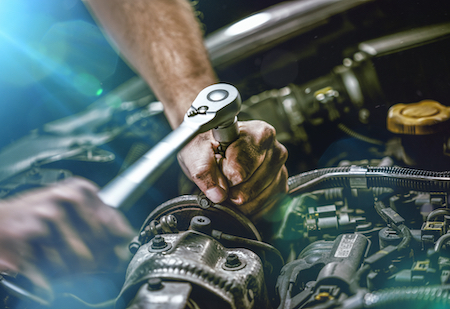 You can check online reviews, and look at what people have to say about a shop. Very quickly you’ll start to discover a pattern forms, and you can tell how well they’re standing up in the community.
You can check online reviews, and look at what people have to say about a shop. Very quickly you’ll start to discover a pattern forms, and you can tell how well they’re standing up in the community.
We also recommend starting with a small service. An oil change or rotating your tires is the perfect task to put an auto repair shop to the test. Small services can allow you to meet the mechanics and see the business from the inside.
And for us, this is where we thrive. You can get to know all of us – we’re a family-run business.
Inspection
Are you in need of a brake job? Do you know your shocks and struts need replacing? If you don’t have a regular auto repair shop you use, you might decide the best way to find one is to call around.
If you give ten different repair shops a call, you might hear ten different courses of action. And ten different quotes that go along with it. All with the “coupon” special, of course.
That’s because it’s nearly impossible to give you a quote over the phone. We can tell you how much brakes are for a car similar to yours. But until we take a look at it, we have no idea of the work that needs to be done.
If you notice a squeak, you might think it’s your brake pads. But with a little more investigation, we might discover the rotors are damaged.
A reputable auto repair shop will be happy to take a look and figure out what’s wrong before finalizing a quote. They will also give you options based on the condition of your car. The more you know the mechanics at the shop, the more they get to know your car, the more they can provide you with courses of action that make sense to your lifestyle and your budget.
Customer service
One of the reasons we suggest starting with a small service to check out an auto repair shop early is to learn how they treat you, no matter what the service. You can tell a lot about a company by the customer service they bring, no matter how much you spend.
Do they call you with recommendations? Do they give you options? Are they all about upselling? Or do they give you the truth, even if it means reducing the sale?
Only you can judge what you think good customer service is about. But we recommend taking the time to talk about your car, listen to explanations and recommendations before you decide to move forward. It’s the best way to get a feel for the type of company you’re dealing with.
Training
How old is your car? Do you care for it well, hoping to make it last for years?
Or maybe you’re the type who likes to trade in your car for a new one every few years?
No matter how old your current vehicle is, you probably realize how much cars have changed over the years. Even a vehicle from a few years ago doesn’t have the technology that today’s modern car has.
https://denverexpresscare.com/why-a-car-diagnostic-test-can-be-important-to-your-wallet
While you might be able to look under the hood and determine what’s wrong from an older car, many newer cars have complicated diagnostic systems. The easiest way to determine where problems lie is to hood it up and let technology tell you.
Of course, you can’t work on an older car in quite the same way as one built just a year ago. With increased technology comes more wires and connections. And if you don’t take that into consideration as you make repairs, you could cause even more problems down the road.
To be a good mechanic today means staying up to date with the industry news. It means learning more about technology and how to implement it in each make and model.
You’ll find that with a car repair shop that cares about reputation.
Convenience
Of course, one of the most important things to you when finding an auto repair shop in Denver is convenience. If you have to drive miles out of your way, or have a difficult time finding a shop, why would you continue to go there?
That’s one of the reasons we selected our location. We’re just off the highway, close to everything you do around town.
We get selecting an auto mechanic is an important decision. If you select wisely, it’ll help you keep your car in great condition.
And that’s what we’re really about. We’re a family-run business with years of dedication to the profession.
If you’re looking for someone you can trust to keep your vehicles on the road, winter, spring, summer, and fall, give us a call.

 Consider for a moment how your wheels move as you drive. As you drive straight, all four wheels move at the same speed and distance. But if you take a turn, the outside wheels will experience more revolutions than the inside wheels to get you safely through the turn. The gears and fluid that allows that to happen is the differential.
Consider for a moment how your wheels move as you drive. As you drive straight, all four wheels move at the same speed and distance. But if you take a turn, the outside wheels will experience more revolutions than the inside wheels to get you safely through the turn. The gears and fluid that allows that to happen is the differential. Question: My water pump went out and it costs much more to replace than the ones I’ve replaced in the past. My technician said it’s because of where it’s located. Why is that?
Question: My water pump went out and it costs much more to replace than the ones I’ve replaced in the past. My technician said it’s because of where it’s located. Why is that?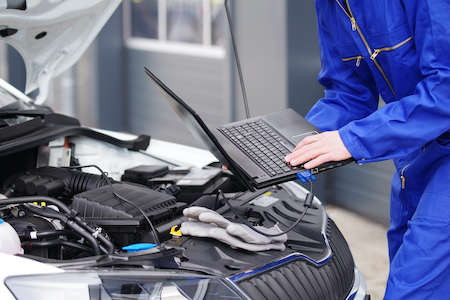 There is a misconception about just how accurate a diagnostic test can be.
There is a misconception about just how accurate a diagnostic test can be.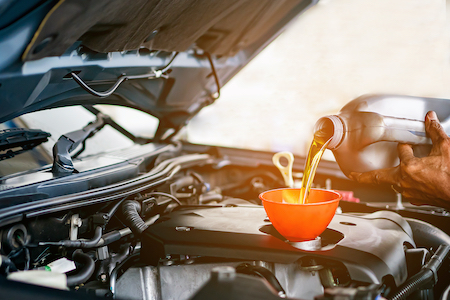 All motor oil is not created equal. If you head into an auto parts store, you’ll see a variety of makes and options sitting on the shelf. That’s because all motors were not created equal. If you purchased a high performance vehicle, that’s different than the family sedan. A car purchased ten years ago will also have different requirements than one you drove off the lot earlier this year.
All motor oil is not created equal. If you head into an auto parts store, you’ll see a variety of makes and options sitting on the shelf. That’s because all motors were not created equal. If you purchased a high performance vehicle, that’s different than the family sedan. A car purchased ten years ago will also have different requirements than one you drove off the lot earlier this year.
 If you’re new to towing, be sure to invest in the right towing equipment for the job. In most towing situations, you’ll need four pieces of equipment:
If you’re new to towing, be sure to invest in the right towing equipment for the job. In most towing situations, you’ll need four pieces of equipment: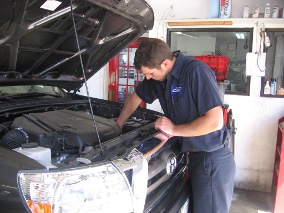
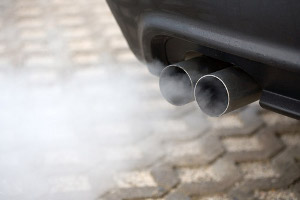 We’ve all heard a car or truck in our neighborhoods that needs a new muffler. But there’s more to the exhaust system than just the muffler.
We’ve all heard a car or truck in our neighborhoods that needs a new muffler. But there’s more to the exhaust system than just the muffler. Express Car Care Question: I was driving on the freeway in Colorado and the engine on my vehicle started to get hot. I turned off my air conditioner and was able to drive the short distance to my meeting and then found a shop in Denver. It turns out that my water pump was leaking. It cost me hundreds of dollars to get it fixed. Is there anything I could have done to avoid this?
Express Car Care Question: I was driving on the freeway in Colorado and the engine on my vehicle started to get hot. I turned off my air conditioner and was able to drive the short distance to my meeting and then found a shop in Denver. It turns out that my water pump was leaking. It cost me hundreds of dollars to get it fixed. Is there anything I could have done to avoid this?